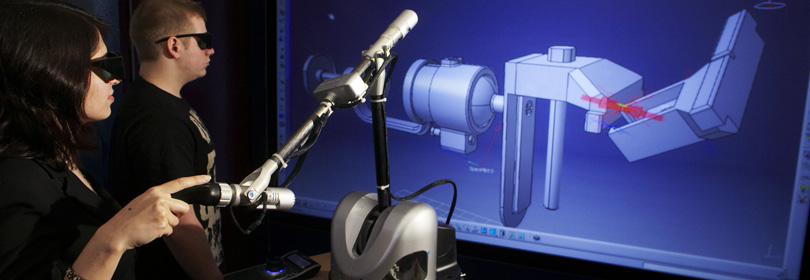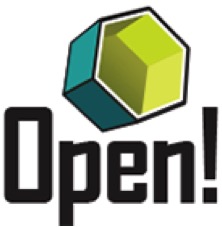G-SCOP s'engage dans l'Etude et le développement d'outils pour l'innovation ouverte basés sur la co-conception et les communautés de concepteurs...
Résumé :
Dans la lignée des mouvements autour de l'open source software, se développe depuis quelques années des initiatives autour de l'open source hardware. Ces initiatives sont largement motivées par des valeurs de développement durable et des démarches responsables de création de nouveau modèles de production et de valeur. G-SCOP en tant que laboratoire leader Français dans les systèmes de production se positionne sur ces approches pour en étudier scientifiquement les mécanismes et proposer des outils d'accompagnement.
OPEN! est un projet collaboratif (PRCI : programme de recherche collaboratif international) France Allemagne piloté par G-SCOP et TU Berlin. L'objectif global du projet est de construire et tester une plateforme d'innovation ouverte (open design) qui tirerait bénéfice des connaissances acquises dans les processus industriel agiles de développement et d'innovation pour fournir aux utilisateurs des structures qui favorisent l'émergence, l'évaluation et la prise de décision. Les enjeux scientifiques se situent à plusieurs niveaux : tout d'abord les nouveaux business modèles autour de ces plateformes doivent s'inventer, particulièrement ceux qui s'appuient sur l'engagement volontaire et la coordination d'acteurs non contractuellement liés, ensuite, la question de la co-conception à distance dans des équipes multi expertises, mais aussi la prise de décision et la convergence, ou le partage de connaissance et la construction de représentations partages des projets est un enjeu majeur de ce type de dispositifs.
Le projet implique un consortium multi disciplinaire et international. Grenoble INP et TU Berlin pour la partie ingénierie et outil, UPMF et Von Humbolt Institute pour les aspects business model et dynamique d'usage des communautés. Les partenaires industriels et associatifs fourniront les études de cas et les terrains d’implémentation. Projet sur 36 mois - kick off meeting début février 2015.
OPEN! est un projet collaboratif (PRCI : programme de recherche collaboratif international) France Allemagne piloté par G-SCOP et TU Berlin. L'objectif global du projet est de construire et tester une plateforme d'innovation ouverte (open design) qui tirerait bénéfice des connaissances acquises dans les processus industriel agiles de développement et d'innovation pour fournir aux utilisateurs des structures qui favorisent l'émergence, l'évaluation et la prise de décision. Les enjeux scientifiques se situent à plusieurs niveaux : tout d'abord les nouveaux business modèles autour de ces plateformes doivent s'inventer, particulièrement ceux qui s'appuient sur l'engagement volontaire et la coordination d'acteurs non contractuellement liés, ensuite, la question de la co-conception à distance dans des équipes multi expertises, mais aussi la prise de décision et la convergence, ou le partage de connaissance et la construction de représentations partages des projets est un enjeu majeur de ce type de dispositifs.
Le projet implique un consortium multi disciplinaire et international. Grenoble INP et TU Berlin pour la partie ingénierie et outil, UPMF et Von Humbolt Institute pour les aspects business model et dynamique d'usage des communautés. Les partenaires industriels et associatifs fourniront les études de cas et les terrains d’implémentation. Projet sur 36 mois - kick off meeting début février 2015.
OPEN! Methods and tools for online community-based product development
G-SCOP is committed to study open design phenomenon and the development of oline communitie-based tools.
G-SCOP is committed to study open design phenomenon and the development of oline communitie-based tools.
Executive summary:
The German and the French national research foundations DFG and ANR co-finance a joint project to support open source product development. The total funding amounts to approximately 780,000 euros.
The German and the French national research foundations DFG and ANR co-finance a joint project to support open source product development. The total funding amounts to approximately 780,000 euros.
Nowadays, everybody can, on a smaller scale, produce like large manufacturers. Not only do fab labs, 3D printers and similar innovations make these home-based productions possible; but the vast array of digital product models available for free on the internet also accelerates the trend. As a spin-off of the open source philosophy, the movement connects do-it-yourselfers, startups and established companies alike as they create product models and share them online.
“The movement, however, is lacking online tools and methods that help to organize the informal structures in open source product development,” explains Dr. Jérémy Bonvoisin, the originator of the project. “A platform which coordinates the contributions of non-contractually engaged volunteers is needed; otherwise the creation of product models will be limited to the knowledge and skills of individual players.” As a consequence, the huge potential of open source design would largely remain unused and models would just cover the production of simple items, often of low quality.
The Franco-German joint project “OPEN!” searches for workarounds. Researchers from the chairs of Industrial Information Technology and Quality Science at TU Berlin are planning to develop an open design platform which aims at combining and organizing the knowledge and skills of contributors involved in open source design projects. In the upcoming three years, the research team — a multidisciplinary consortium involving six public research institutes and companies — will work on the scientific characterization of the open source design paradigm. Already available methods for collaborative product design in industry will be adapted as well as extended for the open source context and ultimately implemented in an online platform prototype. According to Prof. Dr.-Ing. Rainer Stark, head of the project and of the chair of Industrial Information Technology, the project “OPEN!” intends to promote individuals reclaiming the production process: design by the people, for the people. “We expect helping the open source design movement to follow the same trend open source software followed some decades ago: at the beginning a matter of some passionate individuals and today a billion dollar business.”
The project is also about how a business model for knowledge dissemination can result in a long-term stimulation and professionalization of the movement while guaranteeing free and straightforward access to product-related information for all.
Project partners:
Université de Grenoble (Institutes G-SCOP and CERAG), Alexander von Humboldt Institute for Internet and Society (Berlin), Raidlight SAS, OpenIT Agency, P2PLab and Open Source Ecology.
Nowadays, everybody can, on a smaller scale, produce like large manufacturers. Not only do fab labs, 3D printers and similar innovations make these home-based productions possible; but the vast array of digital product models available for free on the internet also accelerates the trend. As a spin-off of the open source philosophy, the movement connects do-it-yourselfers, startups and established companies alike as they create product models and share them online.
“The movement, however, is lacking online tools and methods that help to organize the informal structures in open source product development,” explains Dr. Jérémy Bonvoisin, the originator of the project. “A platform which coordinates the contributions of non-contractually engaged volunteers is needed; otherwise the creation of product models will be limited to the knowledge and skills of individual players.” As a consequence, the huge potential of open source design would largely remain unused and models would just cover the production of simple items, often of low quality.
The Franco-German joint project “OPEN!” searches for workarounds. Researchers from the chairs of Industrial Information Technology and Quality Science at TU Berlin are planning to develop an open design platform which aims at combining and organizing the knowledge and skills of contributors involved in open source design projects. In the upcoming three years, the research team — a multidisciplinary consortium involving six public research institutes and companies — will work on the scientific characterization of the open source design paradigm. Already available methods for collaborative product design in industry will be adapted as well as extended for the open source context and ultimately implemented in an online platform prototype. According to Prof. Dr.-Ing. Rainer Stark, head of the project and of the chair of Industrial Information Technology, the project “OPEN!” intends to promote individuals reclaiming the production process: design by the people, for the people. “We expect helping the open source design movement to follow the same trend open source software followed some decades ago: at the beginning a matter of some passionate individuals and today a billion dollar business.”
The project is also about how a business model for knowledge dissemination can result in a long-term stimulation and professionalization of the movement while guaranteeing free and straightforward access to product-related information for all.
Project partners:
Université de Grenoble (Institutes G-SCOP and CERAG), Alexander von Humboldt Institute for Internet and Society (Berlin), Raidlight SAS, OpenIT Agency, P2PLab and Open Source Ecology.




